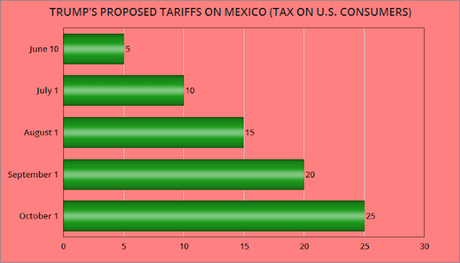
Donald Trump was not happy with just putting a hidden tax on American consumers by placing tariffs on products from China. Now he is proposing substantial tariffs on Mexican products. He will place a 5% tariff on June 10th, and raise that tariff by 5% each month until it reaches 25% in October. He says the tariffs will last until Mexico effectively blocks Central American refugees from coming to the United States -- which Mexico has little control over.
Trump and his cohorts want you to believe that the new tariffs on both China and Mexico will be paid by those countries. That is a huge lie. The tariffs are paid by the U.S. companies that import Chinese and Mexican products, and are then passed on to U.S. consumers in the form of higher prices. Not a single penny will come out of the Mexican and Chinese treasuries to pay these tariffs.
These new tariffs are stupid, and will do nothing to stop refugees from trying to come to this country.
Catherine Rampell, in The Washington Post, gives us 10 reasons why these new tariffs are "mind-bogglingly stupid":
1. Americans are paying these tariffs. We already have twostudies by teams of top-notch trade economists who have found that the costs of Trump’s earlier tariffs are being passed along to American businesses and consumers. An update of one of those studies pegged the cost of tariffs announced before Thursday (including the most recent escalation on $200 billion of Chinese goods) at $831 per U.S. household. It seems reasonable that this latest round of tariffs on Mexican goods will also be largely absorbed by Americans.
2. This will seriously screw up supply chains and hurt American companies — including American companies that need Mexican parts to make their own products that get sold here or exported abroad. Mexico recently became our No. 1 trading partner. Two-thirds of our imports from Mexico are intra-company trade (i.e., a firm trading with itself across the border). The auto industry is especially vulnerable; of U.S. auto exports, about 35 percent of the value-added comes from imported inputs, according to Deutsche Bank Securities chief economist Torsten Slok. Note also that the U.S. auto industry is already in trouble. Announced layoffs for the first four months of this year in autos are the highest since 2009, according to Challenger, Gray & Christmas. 3. We don’t know the full economic cost of the tariffs, but it would be painful for the United States. Two years ago, a research and consulting firm calculated an estimate for the costs of a similar (20 percent) tariff on Mexican imports: “Over three years, the bill comes to $286 billion in lost value to the U.S. economy and a loss of 755,000 American jobs. Two-thirds of those job losses would be at the expense of low- to medium-skilled workers.” 4. It’s not clear the tariffs are legal. The White House said its legal justification for the tariffs is the International Emergency Economic Powers Act. This 1977 law is mostly related to sanctions; it has never been used for tariffs, according to the Congressional Research Service. Some trade lawyers have suggested that the law does not give the president power to unilaterally impose trade duties. 5. Mexico does not have power to do the thing Trump seems to be asking the country to do. He’s asking Mexico to block people from Central America from crossing into the United States to exercise their internationally recognized legal right to seek asylum. 6. There is no plan. There was never a plan. Even acting White House chief of staff (and Office of Management and Budget director, and apparently new Labor Department overlord) Mick Mulvaney acknowledged this in a call with reporters. When asked what it would take to remove the tariffs, he said the decision would be “ad hoc.” 7. This new self-inflicted trade-war wound gives us less leverage in negotiating a new trade deal with China (and the European Union and Japan, both of which we’re also simultaneously trade-warring with). The tariffs will damage our economy and encourage already suffering trade-dependent sectors — including agriculture and manufacturing — to place more pressure on the administration to reach a deal as soon as possible. Basically, it makes our stated willingness to absorb a little more trade-war-related pain less credible, since we’ve absorbed so much pain already. 8. It will also damage our ability to negotiate with China (and the E.U. and Japan) because it proves, once again, that Trump can’t be trusted to keep his word, including in the form of a signed international agreement. Recall that Trump had previously said that his global steel and aluminum tariffs would stay on our friends in Canada and Mexico until a new North American Free Trade Agreement was signed. But after it was signed last fall, he still didn’t remove the tariffs. Finally, two weeks ago, under pressure from lawmakers, he did remove them ... only to turn around and announce fresh across-the-board tariffs on everything from Mexico. Mexico negotiated the new NAFTA in good faith, and then was punished for it. Why would anyone ever make a deal with this president, one that required literally any concessions, given this track record? 9. The decision to impose tariffs — and thereby harm red-state farmers and manufacturers — could cause a rift with the Republican lawmakers who have been protecting him. To be sure, they’ve supported him through the trade wars so far. But at some point even they might break, especially if they think another trade war front could jeopardize their own reelection chances. 10. If Trump does indeed manage to wreck the Mexican economy, that would likely increase the flow of immigrants trying to cross the border into the United States. When the Mexican economy is lousy, after all, demand to come to the United States rises.

